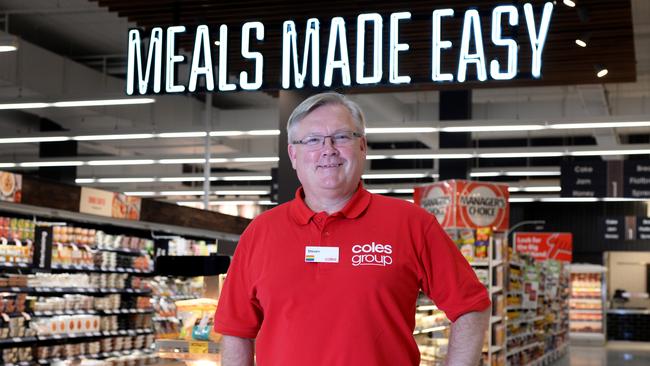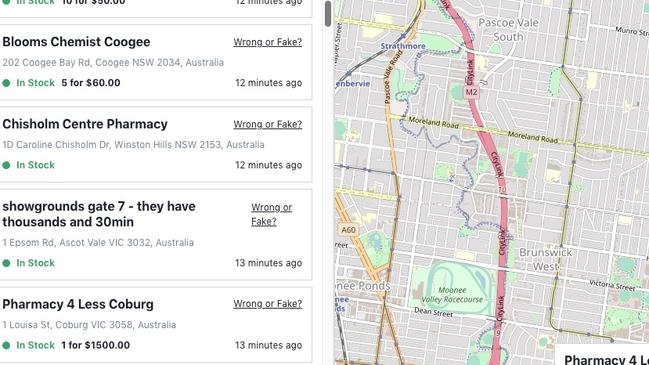Coles RAT tests being delivered by the millions but delays remain
The supermarket giant warns skyrocketing demand means it is scrambling to stock rapid antigen tests fast enough despite delivering millions to stores.

Coles chief executive Steven Cain says the supermarket giant is “delivering millions” of rapid antigen tests to its stores each week, but says it is not enough to satisfy demand as the highly infectious Omicron variant rages across Australia.
Mr Cain says it will take weeks before Coles is able to stock enough rapid antigen tests (RATs) to levels sufficient to supply every customer who wants one.
Australian Competition and Consumer Commission chair Rod Sims has set up a team to investigate RAT pricing after receiving scores of complaints amid a chronic shortage of the kits that can detect coronavirus within 20 minutes. Meanwhile pathology providers, which have reaped billions of dollars in government-funded testing, are struggling to keep up with demand as the number of national daily Covid-19 cases top 100,000.
Mr Cain said Coles were no longer selling RATs online, with the kits only available for sale instore.
“Customer demand for Rapid Antigen Tests has “skyrocketed” over the past two weeks,” Mr Cain said in a note to customers.
“We’re delivering millions of tests each week to our stores and we’ve ordered more from our suppliers, but while demand remains at current levels we expect it will be a few weeks before there are enough tests for every customer who wants to buy them.
“To help try to provide equal access for all our customers, we have introduced the limit of one pack per customer. For an update on availability, check the customer notice at the service desk when visiting your local store. At this stage, the Rapid Antigen Tests are not available when shopping online.”

Australia’s health regulator, the Therapeutic Goods Administration, approved the sale of over-the-counter RATs late last year, despite manufacturers telling the Federal Government early in the pandemic about the benefits of rapid testing.
Slow approval process
For Brisbane-based manufacturer, Ellume, the slow uptake of RATs in Australia has been a main source of frustration. The company is now shipping more than 700,000 of its kits to the US each week after the US government pounced on Ellume’s technology, granting it $US30m to fast track production.
Ellume is now focused on the the US market despite Australia facing widespread shortages. Compounding the limits on supply, is the state governments now accepting RAT tests to allow cross border travel. Up until the start of the month, pathology-based testing - which receives a Medicare rebate of $85 a test - were the only way to gain access to states with relatively few cases, like Queensland.
Similar to the Morrison government’s vaccine swap deals with Poland, the UK and Singapore to secure an extra five million doses of the Pfizer jab and accelerate the nations Covid-19 immunisation program last year, it is now scrambling to sure up the national supply of RATs.
This week the federal Department of Health quietly published five RAT tenders worth almost $62m on the AusTender website.
Food shortages worsen
Food distributors have been calling on the government to make RAT testing more available as pandemic rules force scores of warehouse workers and truck drivers into isolation, fuelling a supply crunch to supermarkets, cafes and restaurants, as well as hospitals and nursing homes.
Mr Cain said the rising Covid cases meant there were fewer people available to work, leading to widespread grocery shortages. Like the supply of RAT tests, he said it will take weeks to see supermarket shelves stocked fully again.
“Over the last few months, the global and domestic disruption caused by the pandemic has presented us with a number of supply chain challenges. This includes a shortage of wooden pallets and transport workers, and international shipping delays,” Mr Cain said.
“More recently, an increase in Covid case numbers in the community has required more people to isolate, which has meant fewer people are available to work in Australia - including in the food industry.
“At Coles, this has resulted in disruptions to deliveries from our suppliers, which in turn has impacted the availability of some products in our stores. While our team are working hard to get stock back onto our shelves, we expect it will take several weeks to fully recover.”
Hiring spree
To accelerate the recovery, Mr Cain said Coles were hiring more workers - similar to the move it adopted at the start of the pandemic when panic buying sparked shortages of essential groceries such as toilet paper. And like rival Woolworths, Coles has also reintroduced buying limits for some products.
Mr Cain has asked customers to try alternatives if their preferred products are not in stock.
“We are hiring additional team members across all parts of our business, and we are fast-tracking the process to get them where they are needed as quickly as possible,” he said.
“We are working with our suppliers to make it easier for them to provide us with the volume of products our customers need, including by reducing the number of different pack sizes we may range for the same product.
“We’re asking customers to bear with us and be flexible for now by trying a different brand or product until we can get the entire range back into stores. We understand that this is a difficult time for many Australians, and we ask that you please continue to be respectful of our team members, who are now commencing their third year responding to the pandemic as essential workers.”



